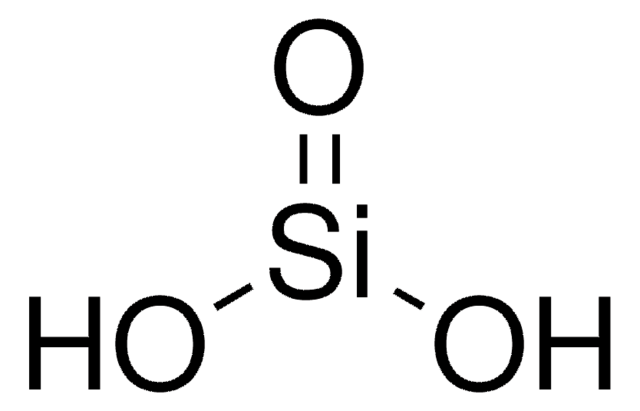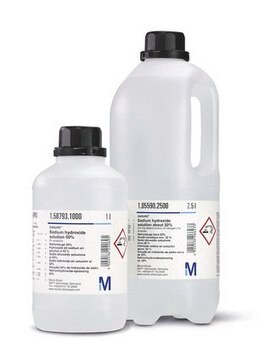306363
Silicic acid
powder, −80 mesh
Iniciar sesiónpara Ver la Fijación de precios por contrato y de la organización
About This Item
Número de CAS:
Número CE:
Número MDL:
Código UNSPSC:
12352301
ID de la sustancia en PubChem:
NACRES:
NA.21
Productos recomendados
Formulario
powder
Nivel de calidad
pérdida
<16% loss on ignition
tamaño de partícula
−80 mesh
cadena SMILES
O[Si](O)=O
InChI
1S/H2O3Si/c1-4(2)3/h1-2H
Clave InChI
IJKVHSBPTUYDLN-UHFFFAOYSA-N
¿Está buscando productos similares? Visita Guía de comparación de productos
Aplicación
Silicic acid is a hydrophilic inorganic material that can be used as a zirconium phosphate additive to enhance proton conductivity in the inorganic-organic composite membranes. It can also be used as a binder for the electrodes of thermal batteries.
Código de clase de almacenamiento
11 - Combustible Solids
Clase de riesgo para el agua (WGK)
WGK 3
Punto de inflamabilidad (°F)
Not applicable
Punto de inflamabilidad (°C)
Not applicable
Elija entre una de las versiones más recientes:
¿Ya tiene este producto?
Encuentre la documentación para los productos que ha comprado recientemente en la Biblioteca de documentos.
Los clientes también vieron
Silicic acid polymerization catalyzed by amines and polyamines.
Mizutani T, et al.
Bulletin of the Chemical Society of Japan, 71(8), 2017-2022 (1998)
The Intimate Role of Imidazole in the Stabilization of Silicic Acid by a pH-Responsive, Histidine-Grafted Polyampholyte.
Demadis KD, et al.
Chemistry of Materials, 27(19), 6827-6836 (2015)
T I Nikoforova
Voprosy kurortologii, fizioterapii, i lechebnoi fizicheskoi kultury, (3)(3), 16-21 (2013-07-04)
This article is focused on the benefits of drug-free therapeutic technologies, such as the use of artificial general siliceous baths for the treatment of patients with arterial hypertension. This approach results in the anti-hypertensive effect simultaneous with the correction of
Li-Na Niu et al.
FASEB journal : official publication of the Federation of American Societies for Experimental Biology, 26(11), 4517-4529 (2012-08-04)
Traditional bone regeneration strategies relied on supplementation of biomaterials constructs with stem or progenitor cells or growth factors. By contrast, cell homing strategies employ chemokines to mobilize stem or progenitor cells from host bone marrow and tissue niches to injured
Tsuyoshi Yamamoto et al.
Journal of plant research, 125(6), 771-779 (2012-04-25)
Rice (Oryza sativa L.) is a typical Si-accumulating plant and is able to accumulate Si up to >10 % of shoot dry weight. The cell wall has been reported to become thicker under Si-deficient condition. To clarify the relationship between Si
Nuestro equipo de científicos tiene experiencia en todas las áreas de investigación: Ciencias de la vida, Ciencia de los materiales, Síntesis química, Cromatografía, Analítica y muchas otras.
Póngase en contacto con el Servicio técnico











